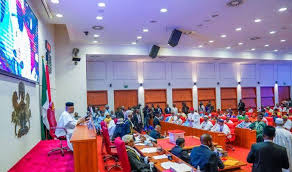The Senate on Tuesday approved a second extension of the capital component of the 2024 Appropriation Act, shifting the implementation deadline from June 30, 2025, to December 31, 2025.
This move grants the federal government additional time to complete ongoing infrastructure projects under the N13.19 trillion capital expenditure allocation within the N34 trillion 2024 budget.
The decision followed the accelerated consideration and passage of a bill to amend the 2024 Appropriation Act during plenary. The bill passed through first, second, and third readings in one legislative sitting.
Chairman of the Senate Committee on Appropriation, Senator Solomon Adeola (APC, Ogun West), who led the debate, said the extension was necessary to avoid project abandonment and ensure continued funding of critical infrastructure.
“Given the limited fiscal space and challenges in fund disbursement, the extension is essential to guarantee the continuity of key national projects and safeguard resources already committed,” Adeola stated.
Initially, the 2024 budget allocated N9.995 trillion for capital projects, N8.768 trillion for recurrent expenditure, and N1.742 trillion for statutory transfers out of a total N28.77 trillion. A supplementary budget of N6.2 trillion, later forwarded by President Bola Tinubu, added N3.2 trillion to capital spending and N3 trillion to recurrent costs.
The capital budget was first extended in late 2024 from its original December 31, 2024 deadline to June 30, 2025, based on a presidential request to improve implementation timelines. However, with many projects still incomplete and the new deadline approaching, lawmakers approved another extension to avoid disruption.
The latest development means Nigeria will now operate two concurrent budgets — the extended 2024 capital budget and the already approved 2025 budget — even as President Tinubu is expected to present the 2026 proposal in four months.
Debate on the bill revealed lawmakers’ growing concerns about delays in fund disbursement and poor budget execution. Senator Yahaya Abdullahi criticised the centralised payment system managed by the Office of the Accountant-General of the Federation, describing it as a key obstacle.
“Contractors have completed their work but remain unpaid. Ministries are not receiving funds. This undermines the credibility of the government,” he said, urging the Senate to engage directly with the President.
Senator Abdul Ningi (PDP, Bauchi Central) supported the extension but called for accountability. “We can’t keep extending without results. Let the Appropriations Committee return in two weeks with a full report,” he said.
Minority Leader, Senator Abba Moro (PDP, Benue South), expressed concern over declining public trust in the budget process. “Even capable contractors are reluctant to continue. The opaque payment system is hurting national development,” he stated.
Senator Seriake Dickson (PDP, Bayelsa West) also called for an urgent probe, lamenting the contrast between poor capital budget performance and the smooth release of recurrent expenditure.
“The capital budget, which delivers real benefits to citizens, remains largely unimplemented, while recurrent spending is fully paid. Governance is suffering due to political distractions,” he said.
Meanwhile, the Network for the Actualisation of Social Growth and Viable Development (NEFGAD), a public finance advocacy group, has criticised the National Assembly for repeatedly extending national budgets.
In a statement issued in Abuja, NEFGAD Country Head, Mr. Akingunola Omoniyi, warned that such actions promote fiscal indiscipline and undermine constitutional financial management.
“The National Assembly’s oversight role on public finance is being compromised. National budgets are time-bound instruments. Referring to the 2024 budget beyond its December 31 deadline is deceptive and unconstitutional,” NEFGAD stated.
The group maintained that while the National Assembly has the power to amend laws, such authority must align with constitutional provisions and the broader national interest. It urged lawmakers to uphold fiscal responsibility and institutional discipline to safeguard Nigeria’s economic stability and democratic governance.









